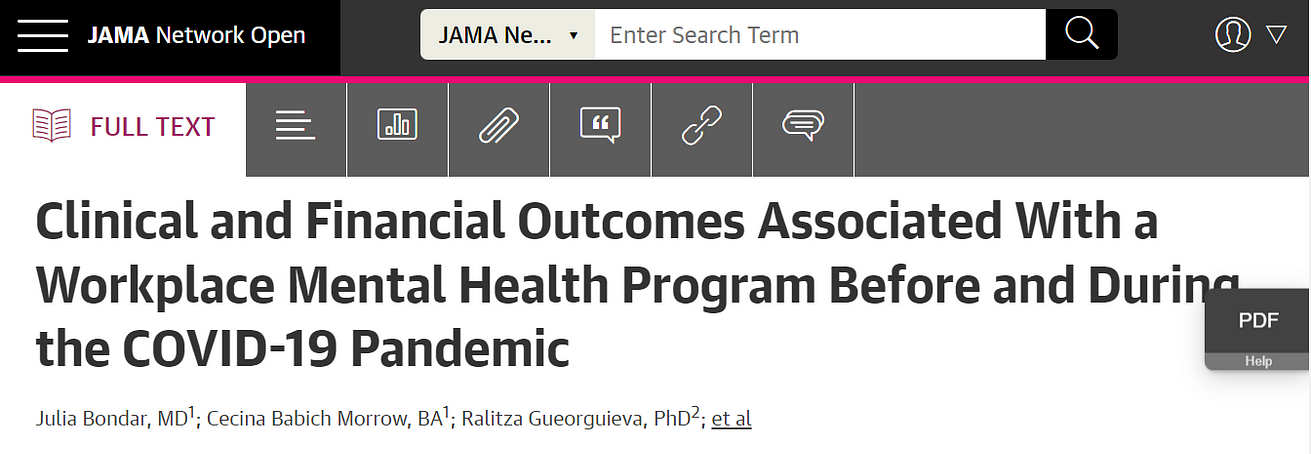Fortune Well
BY MEGAN LEONHARDT
June 9, 2022, 3:00 PM UTC
Presented by CVS Health
A new study shows that comprehensive digital-first mental health benefits can improve workers’ health and their companies’ bottom lines.
ANNASTILLS — GETTY IMAGES
Key Points by
Joaquim Cardoso MSc
health transformation — center of excellence
Mental Health Unit
August 7, 2022
Question
- Is participation in a comprehensive employer-sponsored mental health benefit associated with reduced symptoms for employees and positive financial return on investment for employers?
Findings
- In this cohort study of 1132 employees participating in a workplace mental health program from 66 employers in the US, participants reported reduced symptoms of depression and anxiety.
- The program provided a positive return on investment for all salaries above the federal minimum wage.
Meaning
- Results of this study suggest that employer-sponsored, evidence-based workplace mental health programs can be beneficial for both employers and employees.
The study:
The study specifically evaluated Spring Health’s platform, which includes
- a digital mental health screening,
- telephone and video appointments,
- on-demand digital self-help tools, and
- free or low-cost access to video or in-person psychotherapy and medication management.
ORIGINAL PUBLICATION (full version)

Mental health benefits are proving not only clinically effective, but financially beneficial for employers.
Two-thirds of Americans, 66%, have experienced some anxiety- or depression-related symptoms over the last six months, …
… according to a recent Fortune survey conducted by the Harris Poll at the end of May.
And roughly three in 10 Americans say their overall mental health has been worse since the COVID-19 pandemic started in 2020.
About 38% specifically call out higher stress levels, while 28% report worsening depression.
The effects of mental health issues, particularly depression, can be extensive-not only for patients, but for their families and even employers.
Workers with ongoing depression are typically 35% less productive.
Plus the cost of absenteeism, reduced productivity, and medical expenses related to ongoing and unresolved depression totals an estimated $210.5 billion per year, according to data from the American Psychiatric Association.
… an estimated $210.5 billion per year, according to data from the American Psychiatric Association.
Since the start of the pandemic, many employers have boosted their mental health support offerings as millions of Americans face increased levels of stress, anxiety, depression, and burnout.
But there was some question on whether these programs actually yielded results.

New research published Thursday finds that employer-sponsored behavioral health programs do actually help move the needle in a positive direction.
Researchers at Spring Health conducted a three-year study using data from 1,132 employees at 66 employers across 40 states.
The study, published in JAMA Network Open , found that a comprehensive, employer-sponsored online mental health benefit results in 25% fewer missed work days and a 24% increase in productivity.
Nearly 70% of the Spring Health users evaluated reported a reliable improvement in their mental health, and it only took an average of 5.9 weeks for patients to enter remission of their symptoms.
The study, published in JAMA Network Open , found that a comprehensive, employer-sponsored online mental health benefit results in 25% fewer missed work days and a 24% increase in productivity.
“It’s really important that we take the validation seriously. I think that mental health sometimes, it’s like a feel-good thing, but the reality on the ground is pretty different. People have pretty serious problems,” Adam Chekroud, cofounder and president of Spring Health, tells Fortune.
The study specifically evaluated Spring Health’s platform, which includes
- a digital mental health screening,
- telephone and video appointments,
- on-demand digital self-help tools, and
- free or low-cost access to video or in-person psychotherapy and medication management.
In addition to the health and productivity benefits, the study revealed that mental health benefits improve retention for employers: Spring Health users were 1.6 times less likely to leave their job.
But what about the cost?
A program like Spring Health, for example, can range from $3-$4 per worker per month at larger corporations to $12-$13 for smaller employers.
The mental health platform has partnered with a number of major employers, including General Mills, BlackRock, Whole Foods, and Equinox.
The study found, however, that employers reap an average of more than $7,000 in estimated workplace productivity savings per participant within the first six months.
“Employers will make money, even on a workforce that is entirely federal minimum wage. And so it’s really opening up the opportunity for companies to invest in mental health,” Chekroud says.
While the study published Thursday is specifically based on Spring Health’s approach, there is a potential for a ripple effect among other mental health providers.
“I really hope that it encourages employers to take mental health seriously and sponsor real solutions that will give their employees fast access to care,” Chekroud says, adding that he also hopes the study raises the bar for others offering services in this space.
Originally published at https://fortune.com.
Names mentioned
Adam Chekroud, cofounder and president of Spring Health
REFERENCE PUBLICATION

Abuse Notice
Edit descriptionjamanetwork.com
June 9, 2022
Clinical and Financial Outcomes Associated With a Workplace Mental Health Program Before and During the COVID-19 Pandemic
JAMA Network
Julia Bondar, MD1; Cecina Babich Morrow, BA1; Ralitza Gueorguieva, PhD2; et al Millard Brown, MD1; Matt Hawrilenko, PhD1; John H. Krystal, MD3; Philip R. Corlett, PhD3; Adam M. Chekroud, PhD1,3
- 1 Spring Health, Spring Care Inc, New York, New York
- 2 Department of Biostatistics, Yale School of Public Health, New Haven, Connecticut
- 3 Department of Psychiatry, Yale University School of Medicine, New Haven, Connecticut
Abstract
Importance
- Investment in workplace wellness programs is increasing despite concerns about lack of clinical benefit and return on investment (ROI).
- In contrast, outcomes from workplace mental health programs, which treat mental health difficulties more directly, remain mostly unknown.
Objective
- To determine whether participation in an employer-sponsored mental health benefit was associated with improvements in depression and anxiety, workplace productivity, and ROI as well as to examine factors associated with clinical improvement.
Design, Setting, and Participants
- This cohort study included participants in a US workplace mental health program implemented by 66 employers across 40 states from January 1, 2018, to January 1, 2021.
- Participants were employees who enrolled in the mental health benefit program and had at least moderate anxiety or depression, at least 1 appointment, and at least 2 outcome assessments.
Intervention
- A digital platform that screened individuals for common mental health conditions and provided access to self-guided digital content, care navigation, and video and in-person psychotherapy and/or medication management.
Main Outcomes and Measures
- Primary outcomes were the Patient Health Questionnaire-9 for depression (range, 0–27) score and the Generalized Anxiety Disorder 7-item scale (range, 0–21) score.
- The ROI was calculated by comparing the cost of treatment to salary costs for time out of the workplace due to mental health symptoms, measured with the Sheehan Disability Scale.
- Data were collected through 6 months of follow-up and analyzed using mixed-effects regression.
Results
- A total of 1132 participants (520 of 724 who reported gender [71.8%] were female; mean [SD] age, 32.9 [8.8] years) were included.
- Participants reported improvements from pretreatment to posttreatment in depression (b = −6.34; 95% CI, −6.76 to −5.91; Cohen d = −1.11; 95% CI, −1.18 to −1.03) and anxiety (b = −6.28; 95% CI, −6.77 to −5.91; Cohen d = −1.21; 95% CI, −1.30 to −1.13).
- Symptom change per log-day of treatment was similar post–COVID-19 vs pre–COVID-19 for depression (b = 0.14; 95% CI, −0.10 to 0.38) and anxiety (b = 0.08; 95% CI, −0.22 to 0.38).
- Workplace salary savings at 6 months at the federal median wage was US $3440 (95% CI, $2730-$4151) with positive ROI across all wage groups.
Conclusions and Relevance
- Results of this cohort study suggest that an employer-sponsored workplace mental health program was associated with large clinical effect sizes for employees and positive financial ROI for employers.












